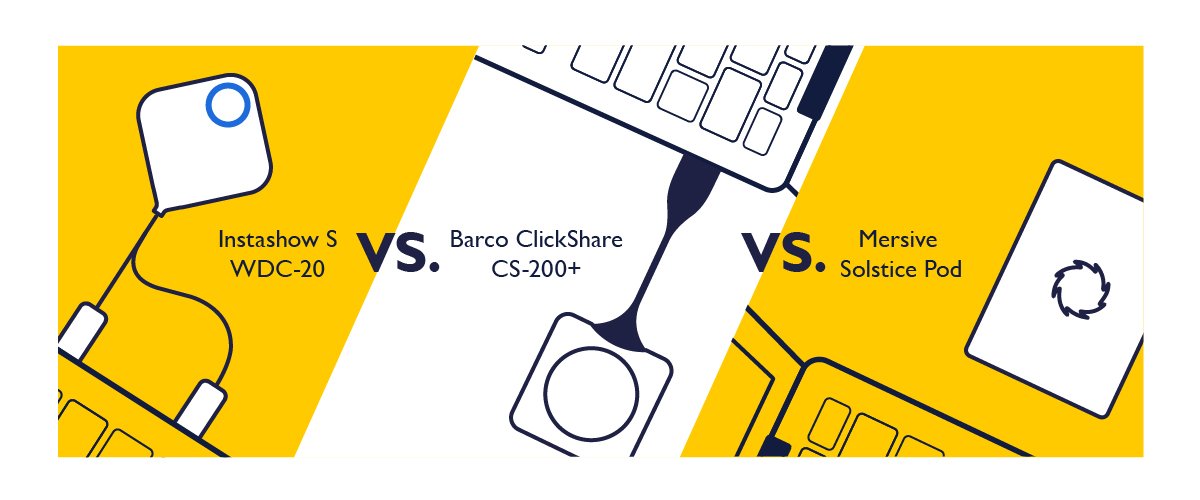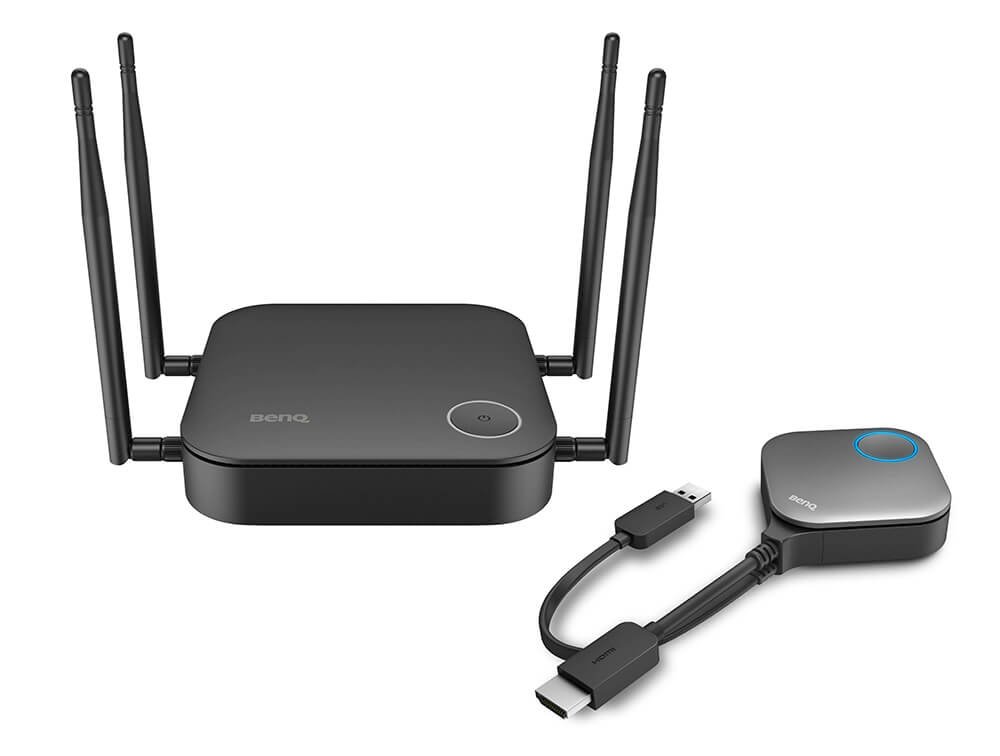What are the best 4K wireless presentation systems – and why?
- BenQ
- 2020-09-11

With 4K laser projectors and interactive flat panels quickly replacing older lamp-based projectors in meeting rooms and classrooms, a 4K wireless HDMI presentation system is the most effective and affordable way to manage multiple presenters and devices on the screen. Here is a breakdown of the three most popular 4K wireless presentation systems – and how they stack up.
- BenQ InstaShow S WDC-20
- Barco ClickShare CS-200+
- Mersive Solstice Pod
Key features to look for when evaluating a 4K wireless presentation system
For classrooms, meeting rooms, and huddle spaces in a post-COVID-19 environment, wireless presentation systems offer the ability to effectively social distance different presenters, split a 4K screen into multiple sections, and enable direct control of a Windows notebook directly from an interactive touch display when collaborating. While all three systems above accomplish these tasks, there are three areas to consider when you are evaluating what is the right system for your space.
- How much support is required to set up and manage?
- How easy for visitors and employees to use?
- Which systems have annual subscription costs?
Fast, Easy & Worry-Free Wireless Presentation System BenQ InstaShow S

How easy is it to set up and manage?
The first area to consider is the amount of time, effort, and resources your wireless system will require to enable it to work effectively. The three different systems have different architectures that will have different demands your IT resources, such as network ports, app deployment, and available bandwidth that your IT department may need to allocate to the system. Proprietary apps also require IT staff to deploy on their employee notebooks and manage updates to ensure security. Finally, for WiFi Hubs architecture, the available bandwidth must be maintained to ensure the system works.
| BenQ InstaShow WDC-20 | Barco CS-200+ | Mersive Solstice Pod | |
|---|---|---|---|
Architecture | BenQ InstaShow WDC-20 Button Based | Barco CS-200+ Button Based | Mersive Solstice Pod WiFi Hub with App |
Network Configuration | BenQ InstaShow WDC-20 Not required - can operate independently of the network | Barco CS-200+ Not required - can work independently of the network | Mersive Solstice Pod Typically required - configure multiple ports and settings |
Application Requirement | BenQ InstaShow WDC-20 No App needed Extended desktop support Miracast support Airplay Support | Barco CS-200+ Required to use Buttons Airplay Support Google Casting | Mersive Solstice Pod Typically required to use and access display |
How easy for visitors and employees to use?
The best 4K wireless systems enable anyone – including visitors who don’t have access to the company network -to connect to a display in under 15 seconds. Why is this important? According to Harvard University, the cost of even a few minutes spent downloading apps, logging into networks, and selecting screens can add up to thousands of dollars in a single year. Some systems may require employee training on how to use the app, and security-conscious visitors may object to downloading an app on their secure notebooks. You will also want to look for a system that natively supports Chromebooks as well as mobile devices whether on Android or iOS without casting your content over the internet.
| BenQ InstaShow WDC-20 | Barco CS-200+ | Mersive Solstice Pod | |
|---|---|---|---|
Connection Time for new user | BenQ InstaShow WDC-20 Under 15 seconds | Barco CS-200+ ~50 seconds to load the app and connect | Mersive Solstice Pod Can be over 1 minute to download the app & connect to the network |
Use without a network connection? | BenQ InstaShow WDC-20 Yes | Barco CS-200+ Yes | Mersive Solstice Pod No - network connection typically required |
Native Chromebook support | BenQ InstaShow WDC-20 Yes – via HDMI button | Barco CS-200+ No | Mersive Solstice Pod No |
Screen Mirroring Support | BenQ InstaShow WDC-20 Miracast AirPlay | Barco CS-200+ Miracast Airplay | Mersive Solstice Pod Miracast Airplay |
Which systems have annual subscription costs?
As with any IT infrastructure product, a good analyst will evaluate the costs of comparable systems using the Gartner model to calculate the total cost of ownership over time. One advantage of a 4K wireless presentation system is that it eliminates the initial costs of installing and hiding cables under floors and behind walls, but with some systems, there are annual fees that are recommended or required for software updates such as apps and security patches. Here is a breakdown of the subscription costs of each platform:
|
BenQ InstaShow WDC-20 |
Barco CS-200+ |
Mersive Solstice Pod - Unlimited |
|---|---|---|---|
Initial Cost (MSRP) | BenQ InstaShow WDC-20 $1499 | Barco CS-200+ $2250 | Mersive Solstice Pod - Unlimited $1399 |
Annual Subscription cost | BenQ InstaShow WDC-20 No annual fee Updates provided for free | Barco CS-200+ Subscription Option with or without a dedicated server | Mersive Solstice Pod - Unlimited Annual subscriptions up to $780 per year per device |
Application Required | BenQ InstaShow WDC-20 None – App free button Extended desktop support Miracast Support AirPlay Support | Barco CS-200+ Required to use Buttons Airplay Support Google Casting | Mersive Solstice Pod - Unlimited Typically required to use and access displays |
Conclusion
All three systems are solid choices for both classrooms and corporate collaboration areas. Each system has unique advantages, such as the ability for the BenQ InstaShow WDC-20 to replay video content at 60 frames per second. Also, both the InstaShow and Mersive solutions can allow four different presenters (ClickShare allows only two) to present at the same time. But if you are looking to see which one would be the best for you, the easiest way is to try out one for free. Simply click here to learn how you can set up your collaboration space and save $300 if you choose to keep it.